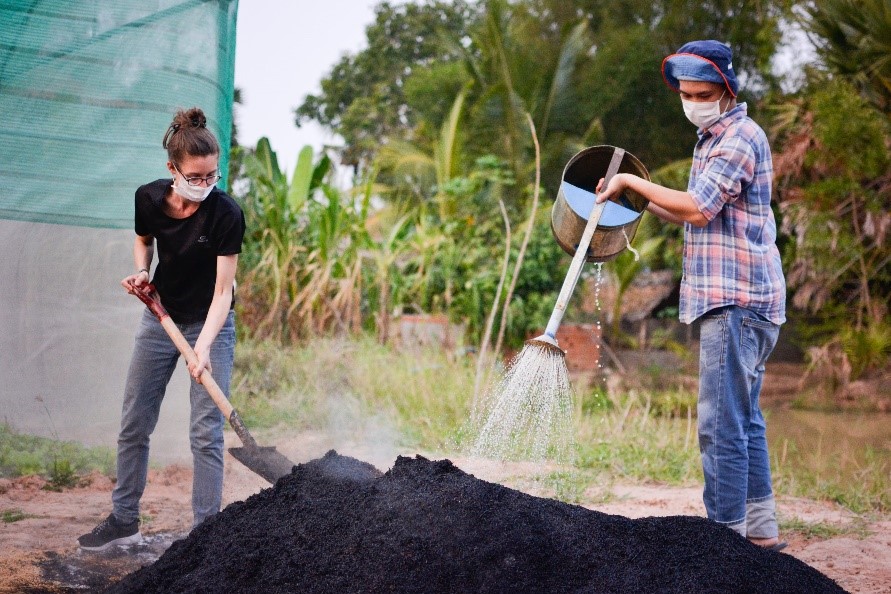- Cambodia
For more than 15 years, the promotion of agroecological techniques has been at the heart of Eclosio (ex-ADG)’s work in Cambodia. However, this transition is coming up against various obstacles, such as farmers’ access to quality natural fertilizers.

The result of these difficulties is to slow down the agro-ecological transition, which is essential for sustainable, respectful soil management.
In order to overcome these problems, Eclosio, in partnership with the FAEC (Federation of Farmer Associations Promoting Family Agricultural Enterprise in Cambodia), aims to assist the farmers of the Oudom Sorya cooperative in the production of a high-quality natural fertilizer, “Bokashi”, and to help them market it to other producers and local markets.
Bokashi is a mixture of organic matter and micro-organisms that are essential for maintaining and improving soil structure, ventilation, water retention capacity and nutrient absorption. The micro-organisms used also improve the soil’s resistance to various diseases and pathogens.
Originating from the province of Takéo, Oudom Sorya is an agricultural cooperative created in 2013 by a group of farmers collectively committed to commercial activities such as fertiliser and rice production. It now has over 80 members, 34 of whom are women.
For Eclosio and FAEC, the primary objective is to improve soil fertility by supporting Oudom Sorya in the production of this fertiliser, based on the sharing of natural inputs present on several of the cooperative’s farms.

To bring this project to fruition, Eclosio and the FAEC are working in three main areas:
- To develop a natural fertilizer formula tailored to the needs of small-scale producers
- To support Oudom Sorya in the production of this fertilizer
- To design a sales and marketing strategy together
These initiatives are aimed primarily at members of the cooperative. In the long term, however, the aim will also be to attract other producers who want to use natural fertilisers but who have neither the time nor the necessary inputs to produce them.
Finally, in the long term, the experience with Oudom Sorya will serve as a model for other agricultural cooperatives and farmers’ organizations in the network.
The work of Aude and Oudom, agronomy students, Eclosio and FAEC.

One is Belgian, the other Cambodian. For their final year work, they decided to join the Bokashi project. For them, the challenge of finding an alternative to the use of chemical fertilizers was a real source of motivation. According to the experiment carried out last year, the Bokashi produced by the programme is already three times more effective than the natural fertilizers produced by farmers, encouraging them to continue the study. This year, Aude and Oudom’s research will aim to improve the quality and effectiveness of the previous Bokashi, while maintaining an affordable price for local producers.
As Aude reminds us, the development of Bokashi is far from being the result of student research alone. It is first and foremost a team effort, in which the different players, with their different skills and approaches, enrich the project.
The Bokashi is the culmination of 3 years’ work combining the field experience of the cooperative’s farmers, the knowledge of ADG’s agricultural engineers, logistical and financial support from FAEC and ADG, exchanges of techniques with other organisations and student research.
The first part of their work consisted in finding the appropriate methodology for their research, based on the work of the previous student and other scientific studies.
Once the methodology had been validated, the team set about producing three different types of micro-organisms in March, with laboratory analysis revealing which were the most effective. Once they had reached maturity, the selected micro-organisms were incorporated into the Bokashi.
On 5 and 6 April, the farmers and students produced 1.8 tonnes of Bokashi in a serious but relaxed atmosphere, under a blazing sun.
The duo are currently testing this production.
Oudom, for his part, analyses the nitrogen, phosphorus, potassium, quantity of micro-organisms present and moisture content of the samples in the laboratory. With the help of the farmers, Aude is busy preparing the ground for the experiment: building a new greenhouse and repairing an old one, taking daily measurements of the pH and temperature of the Bokashi and preparing the seedlings for the lettuces and Chinese broccoli, the test vegetables for the experiment.
Over the coming weeks, the aim will be to study the yield of the Bokashi. Every 4 days, Aude will measure the size of the lettuces and Chinese broccoli. The final weight of these vegetables will be used to determine the effectiveness of the new Bokashi.
For the moment, all we can say is that they’re growing like crazy and they’re really green! If the results are really positive, the Bokashi could be marketed.
This is another area that the Eclosio team in Cambodia is currently working on. A brochure, posters, Facebook page and awareness campaign are being created to raise the profile of the cooperative and its Bokashi.
Valentine Collet